Principle 1. Businesses should support and respect the protection of internationally proclaimed human rights
Principle 2. Businesses should make sure that they are not complicit in human rights abuses
Principle 3. Businesses should uphold the freedom of association and the effective recognition of the right to collective bargaining
Principle 4. Businesses should uphold the elimination of all forms of forced and compulsory labour
Principle 5. Businesses should uphold the effective abolition of child labour
Principle 6. Businesses should uphold the elimination of discrimination in respect of employment and occupation
Human Resource Management
The human resources policy of NC KazMunayGas JSC was updated in 2024 and serves as a strategic document outlining the key principles, objectives, and directions for managing human capital within the Company. The policy was developed in accordance with the Labor Code of the Republic of Kazakhstan, corporate standards of Samruk-Kazyna JSC, and KMG’s Development Strategy for 2022–2031.
Core principles of KMG’s HR policy:
- Meritocracy and fairness – ensuring transparency in HR processes and supporting high-potential employees.
- Fostering an engaged culture – collaborative work towards the Company’s strategic goals at all levels.
- Social responsibility – upholding labor rights, ensuring safe working conditions, and supporting employees’ social well-being.
- Teamwork and creativity – promoting team spirit, initiative, and a creative approach to problem-solving.
- Openness – nurturing a corporate culture of constructive dialogue and feedback.
- Continuous learning – ongoing enhancement of employees’ knowledge and skills.
- Gender equality and inclusion – providing equal opportunities and conditions for all employees.
- Succession planning – ensuring knowledge, experience, and values are passed from one generation of employees to the next.
KMG adheres to international labor standards, including the UN Guiding Principles on Business and Human Rights, ILO standards, and the principles of sustainable development.
In case of changes in working conditions, the Company provides written notice to the employee no later than fifteen calendar days in advance. The minimum notification period for significant business changes is four weeks.
The effectiveness of the HR policy is evaluated using indicators such as labor productivity, employee turnover, engagement index, internal promotions, training and development levels, gender balance in management bodies, and other relevant metrics.
Workforce Size and Structure
GRI 2-7GRI 2-8GRI 202-2GRI 405-1
As of the end of 2024, the total headcount of KMG Group amounted to 49,24312 employees, representing a 2 % increase compared to 2023. By gender, 81 % of employees are men and 19 % are women, which reflects the specifics of the oil and gas industry, traditionally associated with physically demanding work.
Among administrative and managerial staff, 48 % are men and 52 % are women. In contrast, among production personnel, women account for only 16 %, while men comprise 84 %.
The share of senior executives13 in regions of operation14 hired from the local population is 90 % (compared to 83 % in 2023).
The regions with the highest concentration of personnel are: Mangystau Region (22,026 employees), Atyrau Region (10,605 employees), Pavlodar Region (3,119 employees), and the city of Astana (2,120 employees). A significant number of employees (6,910) work in KMG Group companies located outside the Republic of Kazakhstan.
In 2024, 3,357 individuals were employed under outsourcing arrangements.
12 Starting from 2024, the KMG Group accounts for the headcount based on the payroll. In previous reporting periods, the actual headcount was considered. As a result, historical personnel data may differ.
13 Senior executive – the first manager and his deputies.
14 Region of operations – region (region, district) of operational activities.
STAFF HEADCOUNT
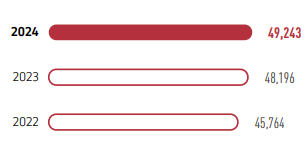
STAFF STRUCTURE BY GENDER GROUPS AS OF THE END OF 2024
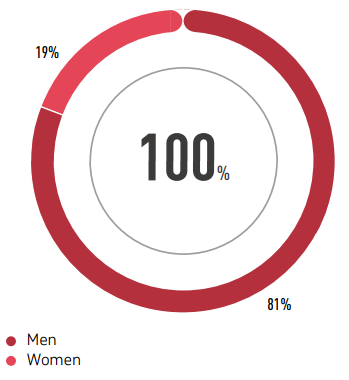
STAFF STRUCTURE BY AGE GROUPS AS OF THE END OF 2024
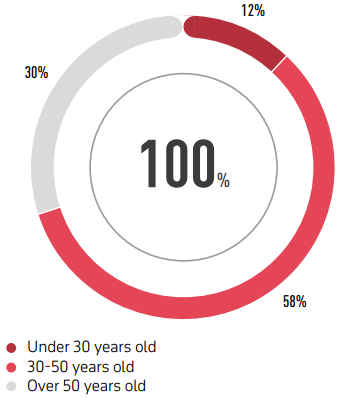
STRUCTURE OF ADMINISTRATIVE AND MANAGERIAL PERSONNEL AS OF THE END OF 2024
BY GENDER GROUPS
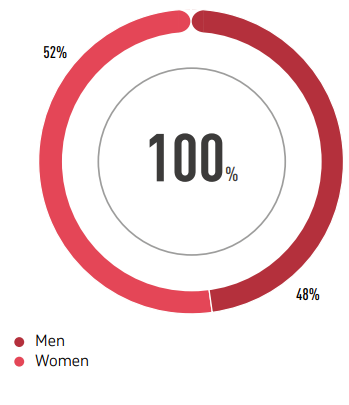
BY AGE GROUPS
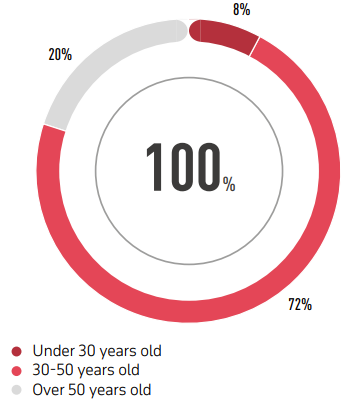
STRUCTURE OF PRODUCTION PERSONNEL AS OF THE END OF 2024
BY GENDER GROUPS
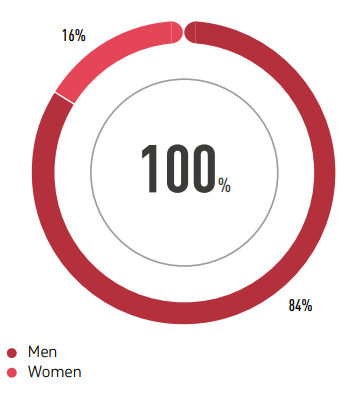
BY AGE GROUPS
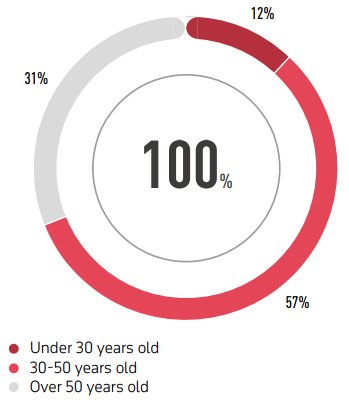
EMPLOYEE HEADCOUNT BY REGION AS OF THE END OF 2024, PERSONS
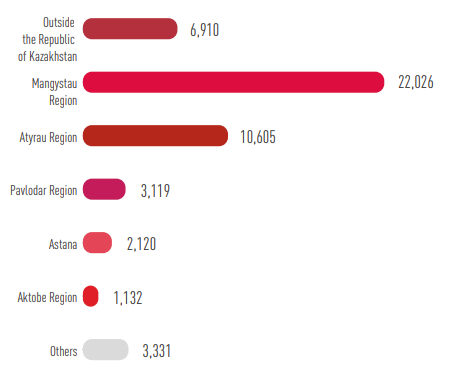
NUMBER OF EMPLOYEES WHO TOOK MATERNITY LEAVE AND CHILD CARE LEAVE
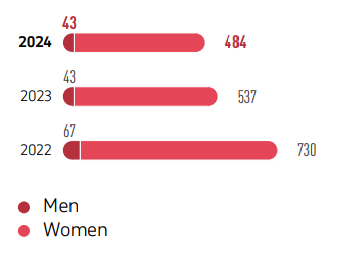
STAFF TURNOVER RATE
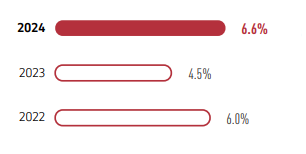
The staff turnover rate at the end of 2024 was 6.6 %15. A total of 3,272 employment contracts were terminated.
As of the end of 2024, a total of 527 employees were on maternity and parental leave, including 484 women and 43 men. In accordance with the labor legislation of the Republic of Kazakhstan, all employees are entitled to parental leave.
15 In 2024, the KMG Group changed the methodology for calculating staff turnover. In previous years, turnover = A/B*100, where A is the number of employees who quit on their own initiative, by agreement of the parties or through the fault of the employee, at the end of the reporting period; B is the average number of employees for the reporting period. In 2024, turnover = A/B*100, where A is the number of employees who quit on their own initiative, by agreement of the parties or through the fault of the employee, at the end of the reporting period; B is the list number for the reporting period.
Recruitment and Onboarding
Effective human resource management at KMG is based on systematic forecasting of staffing needs, taking into account the Company’s strategic plans (in the areas of petrochemical development, strengthening KMG’s role in major oil and gas projects, launching production at new fields, energy transition, and carbon footprint reduction).
KMG aims to attract highly qualified professionals who meet business requirements. The main approaches to talent acquisition include:
- Promoting the company’s HR brand through partnerships with universities, participation in industry events, and career guidance programs.
- Using automated recruitment tools, including corporate platforms (work.kmg.kz, qsamruk.kz) and recruiting services.
- Competitive selection of candidates, with a focus on the internal talent pool within the KMG Group.
- Creating an attractive employee value proposition (EVP) that includes competitive compensation, professional development, and social benefits.
To ensure the successful integration of new and transferred employees, KMG applies a comprehensive onboarding system that includes:
- Corporate onboarding – familiarization with the Company’s history, values, strategy, and structure.
- Social onboarding – establishing effective communication within the team.
- Organizational onboarding – learning the company’s rules and procedures.
- Technical onboarding – training in the use of corporate IT systems and equipment.
- Professional onboarding – mastering job-related processes and role expectations.
- Psychophysiological onboarding – supporting adaptation to work and rest schedules.
In 2024, KMG hired 3,928 employees. By gender, 82 % of new hires were men and 18 % were women.
Age group distribution among new hires shows that the largest share falls within the 30–50 years range (58 %), followed by those under 30 (28 %) and over 50 (14 %).
The highest number of new employees was hired in the Mangystau Region (1,037), Atyrau Region (778), Pavlodar Region (224), and Astana (483). A significant number were also hired outside the Republic of Kazakhstan (1,035 employees).
STRUCTURE OF NEW HIRES IN 2024
BY AGE GROUPS
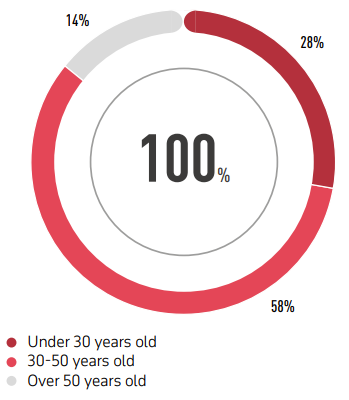
BY GENDER GROUPS
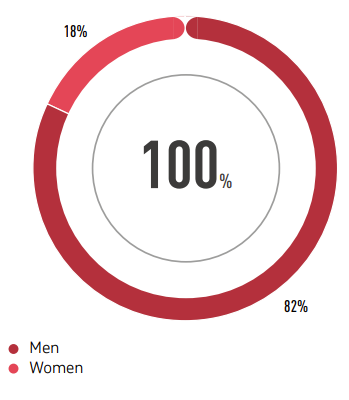
NUMBER OF EMPLOYEES BY REGION AS OF THE END OF 2024, PERSONS
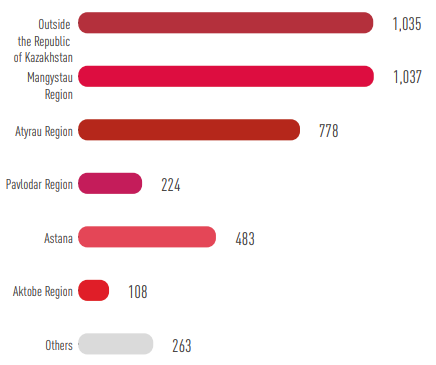
Training and Development
Continuous professional development is one of the priorities of the Group’s HR policy. KMG invests in employee training in alignment with the strategic needs of the business and modern technologies. The key areas of development include:
- Qualification enhancement, including international certification and the acquisition of additional competencies;
- Management skills training for middle-level managers;
- Training of engineering, technical, and blue-collar personnel;
- Development of digital skills and competencies related to automation and data analytics;
- Collaboration with universities and dual education programs;
- Support for employees in obtaining higher-level qualifications (master’s, doctoral, MBA, DBA programs);
- Development of outplacement programs to provide new employment opportunities for staff in the case of organizational restructuring or retirement by acquiring additional qualifications;
- Implementation of internal educational platforms, including digital training catalogs and mentorship programs.
The company systematically invests in personnel development. In 2024, KMG allocated KZT 5,109.7 million for employee training, which exceeds the 2023 figure (KZT 4,115.7 million) by 19 %.
The average number of training hours per employee amounted to 35 hours in 2024, which is 2.9 % higher than in 2023 (34 hours). On average, male employees received 38 hours of training, while female employees received 25 hours–this difference is attributed to the structure of the production workforce16.
16 The indicators for 2023–2022 have been recalculated due to changes in methodology. The average number of training hours per em - ployee = the total number of training hours completed by employees / the headcount at the end of the period.
INVESTMENTS IN TRAINING, MILLION TENGE
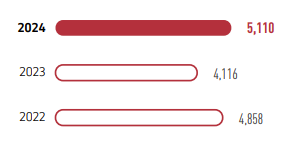
AVERAGE NUMBER OF TRAINING HOURS PER EMPLOYEE
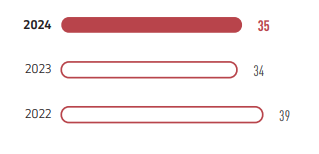
KEY TRAINING AND PROFESSIONAL DEVELOPMENT PROGRAM TOPICS
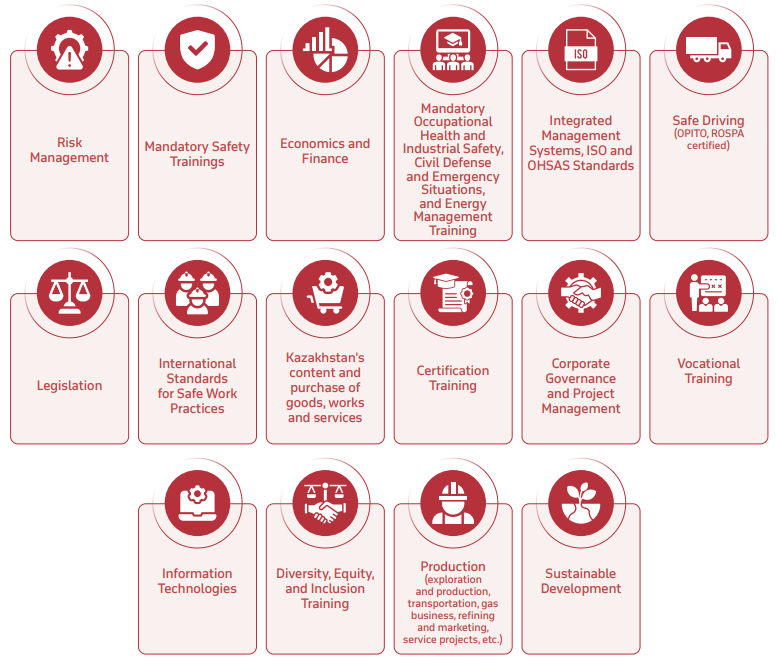
Safety and Risk Management Training
- To prevent road traffic accidents, KMG conducted defensive driving training in accordance with the international ROSPA standard. A total of 3,404 drivers responsible for transporting personnel and hazardous materials completed the training (compared to 691 people in 2023 and 350 people in 2022). The program will continue in the coming years.
- Training on “Internal Auditor of Integrated Management System” (ISO/OHSAS) was held with 255 employees participating.
- 422 employees completed training in risk assessment skills.
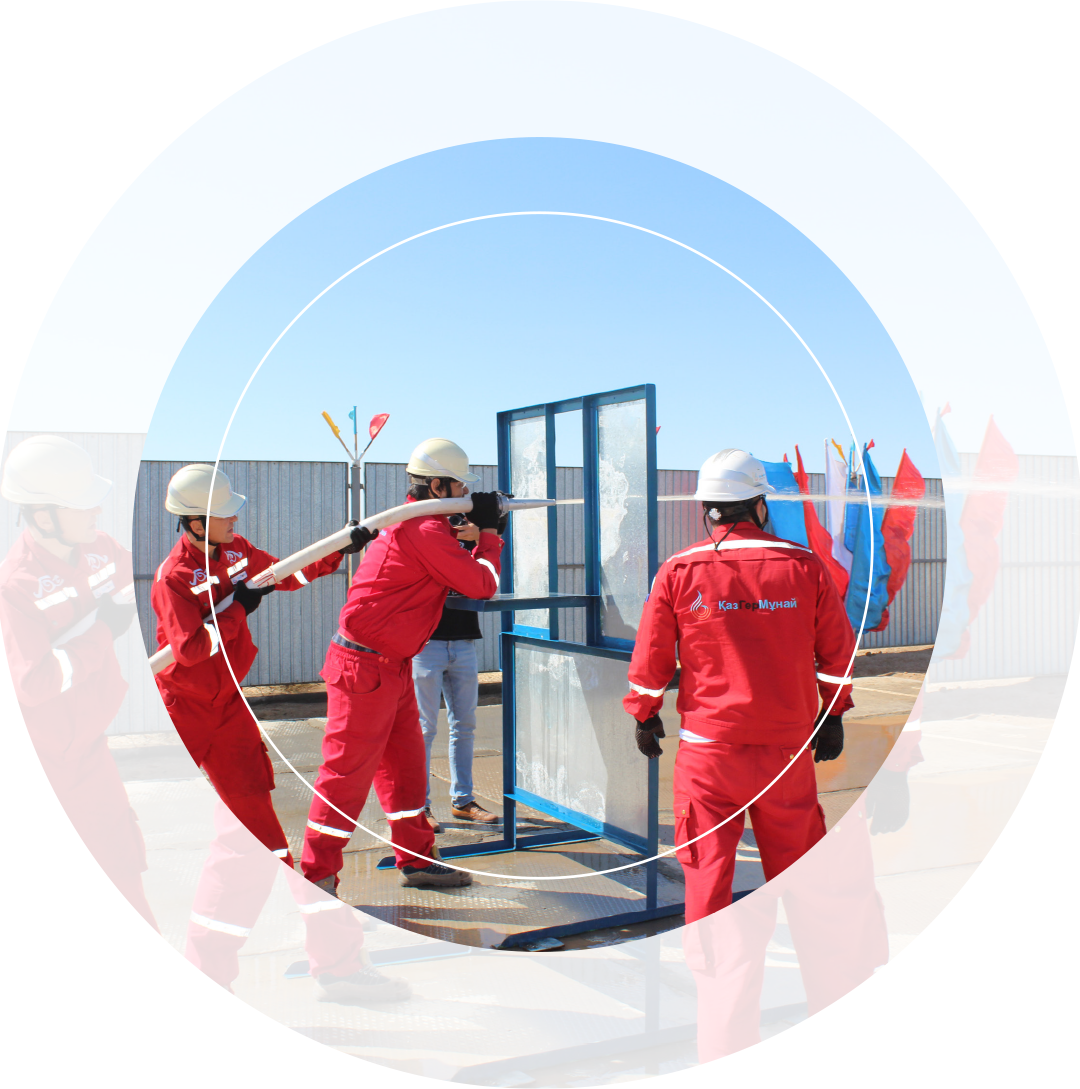
International Qualifications and Certifications
- 63 employees were trained to obtain international qualifications and certifications under programs such as DipIFR, ACCA, IPMA, CIMA, PMP, CFA, CIA, and others.
- As part of the annual certification of key personnel at KMG and its subsidiaries in line with the IPMA international project management standard, 83 specialists passed certification and exams.
- Over 500 employees of KMG and its subsidiaries participated in internal project management training.
Modular Training Programs
- With the support of Samruk-Kazyna JSC, modular programs were implemented in the following areas: IR School, HR School, CnB School, and Chief Geologist. A total of 48 employees took part in the training.
- In cooperation with Eni SpA Affiliate Agip Caspian Sea B.V., an offline “Total Project Management” training was held, delivered by ENI Corporate Training Center professor Manuel Martinatti. The program was attended by 43 employees.
Industry-Specific Educational Programs
Two specialized educational programs were successfully completed:
- FROSIO Certified Coating Inspectors – 7 employees were trained in accordance with FROSIO requirements and ISO/IEC 17024.
- Well Control under the IWCF international standard – 7 employees trained.
These international certificates confirm a high level of professional knowledge and the ability to ensure safety in drilling and corrosion protection.
Youth Educational Initiatives
As part of the “ALYP” program, a new phase of training was conducted for young transformation leaders, including:
- Module 1: DMAIC project implementation methodology;
- Module 2: Basics of effective interaction and personal efficiency;
- Module 3: Financial and technological literacy.
In 2024, 63 specialists completed the training. Upon completion, participants implement individual projects and can become mentors for new program groups.
Under the youth program “Zheti Qadam”, nine employees completed training focused on developing managerial competencies, communication skills, and understanding the principles of budget planning.
Training in Sustainable Development
As part of KMG’s strategic goal “Sustainable development and reduction of carbon intensity,” the following trainings were held:
- Carbon Capture, Utilization and Storage (CCUS) (INPEX Corporation).
- Training of greenhouse gas verification experts.
- Greenhouse gas management at enterprises.
- ESG strategic seminar.
- Waste management.
- Biodiversity impact management.
- GHG emission regulation and ESG integration.
- Low-carbon development and carbon footprint training.
- Green Ports and EcoPorts certification.
- Petro Decarbonization Program.
- Carbon capture, utilization, and storage.
- Diversity and inclusion.
Employee Performance Evaluation
KMG aims to enhance labor efficiency through a performance evaluation system that also facilitates employee potential development and career advancement. The core principles of the performance evaluation system include:
- Cascading corporate business goals into individual KPIs.
- A transparent and objective system for evaluating employee results.
- Feedback and adjustments to individual development plans.
- Regular assessments and consistent methodology.
PERCENTAGE OF EMPLOYEES WHO RECEIVED REGULAR PERFORMANCE AND CAREER DEVELOPMENT REVIEWS, %
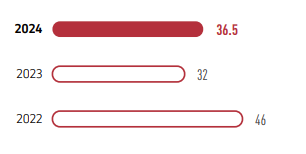
Succession SYSTEM and Talent Management
KMG is developing the internal talent pool and succession system for key positions. This approach includes:
- Selection of high-potential employees and preparation for leadership positions.
- Development of career paths and individual development programs.
- Transfer of knowledge from foreign specialists to local employees.
- Development of cross-functional expertise and internal mentoring.
To support and accompany the professional development of young specialists, newly hired employees, talent pool members, and KMG Group staff, KMG has introduced an institute of Internal Trainers and Mentors.
Talent pool formation and development across the KMG Group is conducted through the “MANSAP” project. In 2023–2024, a mentorship program was launched under which successors from Pools A and B act as mentors for Pool C participants.
At the end of 2024, selection was carried out for the industrial talent pool in the following areas: Oil Refining and Petrochemicals, Exploration and Production, Transportation and Marketing, and Oilfield Services. More than 1,000 employees participated in the selection.
In 2024, 35 % of key position appointments were made from the talent pool.
YOUNG PROFESSIONALS Engagement
KMG actively collaborates with educational institutions in the regions where its production facilities are located by implementing programs for training young professionals:
- Education funding for students – in 2024, 1,966 students had their university education financed by various KMG enterprises.
- Internship programs – in 2024, 1,713 students completed industrial or pre-graduation internships.
Key youth development programs include:
- “Zhas Maman” – a program for young professionals at Atyrau Refinery. In 2024, 9 people participated; 4 completed training, 2 were employed, and 5 continued their studies.
- Dual Training – a combination of education, internship, and employment:
- EMG – 106 participants, 10 employed;
- KBM – 57 participants;
- Atyrau Refinery – 30 participants, 7 employed;
- Pavlodar Refinery – 86 participants, 22 employed;
- KPI – 10 participants;
- PKOP – 27 participants;
- KMG International – 42 participants.
- “KMGE School” – a program for training niche specialists for KMG Engineering LLP. In 2022–2024, 18 people were trained, of which 18 were employed, and 3 people continue their education.
- “Intern” – a vocational training program at Atyrau Refinery. Between 2023–2024, 60 participants were trained, 31 of whom were hired. An additional 20 interns were selected in 2024.
In 2024, KMG, together with Mangistaumunaigas JSC, implemented a unique project to train 60 unemployed residents of the Mangystau region. The goal was to reduce unemployment and ensure socio-economic stability in the region.
The “Educational Intensive” program was specially designed to prepare participants for employment. During the program, future specialists acquired key professional skills, gained knowledge of the oil and gas industry, and adapted to work processes.
Upon completion, all graduates were offered employment at Mangistaumunaigas JSC. For many, this became their first job, providing practical experience and launching their careers in the oil and gas sector.
remuneration and Motivation Management
GRI 401-2GRI 202-1GRI 405-2GRI 201-3
KMG adheres to the principles of fairness, transparency, and objectivity in remuneration management.
Key components of KMG’s remuneration system:
Remuneration
- A grading system ensures internal fairness and market competitiveness.
- Differentiated pay based on job complexity, qualifications, level of responsibility, and employee performance.
- A performance-based bonus system linked to key performance indicators (KPIs), including incentive programs to motivate employees.
- Labor market monitoring and salary benchmarking to maintain competitiveness.
- Transparency of the remuneration system, enabling employees to understand how their salaries are determined and what factors affect changes.
Social Benefits and Support Programs
- Voluntary medical insurance – for employees and their family members.
- Non-state pension provision – to ensure additional financial stability for employees.
- Partial reimbursement for wellness and fitness activities – to promote employee health.
- Well-being programs – to ensure comfortable working conditions and improve workplace infrastructure.
- Financial support for employees in difficult life situations – such as childbirth, serious illness, or the loss of loved ones.
Non-Material Incentive Programs
- Professional excellence competitions – to reward top performers.
- Public recognition and awards – for outstanding contributions.
- Encouragement of creative initiatives and participation in Kaizen programs (process improvement).
- Promotion of a feedback and engagement culture – to strengthen internal communication.
KMG applies a grading-based remuneration system, ensuring equal pay for equal work regardless of social category. In 2024, the average ratio of women’s to men’s average remuneration across the Company was 97 %. By personnel category, the ratio stood at 72 % among administrative and managerial personnel (AMP) and 92 % among production personnel (PP). The difference in average pay within AMP is due to the variation in positions held within this group.
The ratio of entry-level salaries to the national minimum wage in 2024 was 6.18 for men and 7.24 for women.
KMG strives not only for a fair and effective compensation system but also to foster an environment where every employee feels valued and motivated to build a long-term career within the Company.
Employee Pension Plans
In accordance with national legislation, pension savings of citizens of the Republic of Kazakhstan are held in the Unified Accumulative Pension Fund as well as in voluntary pension funds.
KMG also fulfills additional social support obligations for retired employees through collective bargaining agreements. Employees retiring upon reaching the statutory retirement age, as well as those already retired, are provided with:
- Financial assistance for national and state holidays of the Republic of Kazakhstan;
- One-time payments upon reaching milestone ages;
- Sanatorium treatment vouchers with partial cost compensation;
- Other forms of social support.
Additionally, KMG enterprises implement a pre-retirement employee support program, offering the option of early retirement with compensation upon mutual agreement. Employees reaching retirement age also receive compensation when concluding employment.
|
Indicator |
2022 |
2023 |
2024 |
|---|---|---|---|
|
Social contributions and mandatory pension deductions, in billion KZT |
66 |
79 |
101 |
Social Policy
KMG strives to ensure favorable working conditions and a high level of social protection for its employees. The main areas of the Company’s social policy include:
- Support for projects focused on continuous production improvement.
- Implementation of collective agreements and social programs.
- Support for inclusivity and equal opportunities.
- Improvement of working and living conditions for employees at production sites.
- Development of corporate social responsibility through support for vulnerable population groups.
- Organization of corporate volunteering programs.
- Development of internal communications.
- Conducting social stability research and developing improvement plans based on the results.
Social Stability Level
In 2024, the level of social stability in KMG’s labor collectives was assessed as satisfactory – the index reached 79 %, which is 4 percentage points higher than in 2023 (75 %).
To assess social stability, the annual Samruk Research Services study is conducted. Its results are used to develop individual action plans at the enterprise level. These plans aim to address identified problem areas and improve employee satisfaction. Measures include improving working conditions, enhancing feedback systems, organizing comfortable living and dining arrangements, among others.
In 2024, the Corporate Center introduced a unified action plan template across all subsidiaries to improve SRS performance and initiated on-site consultations to assist with plan development, thereby strengthening the Company’s social policy.
Employee Living and Working Conditions
KMG systematically works to improve the working and rest conditions of its employees. These issues are included in the social stability improvement plans of subsidiaries and reflected in roadmaps for 2023–2027 developed by all Group companies.
In 2024, improvement projects were planned at 183 facilities of social infrastructure. Of these:
- Work was completed at 106 sites,
- 20 new facilities were built,
- Major repairs were carried out at 23 facilities,
- Current repairs were completed at 51 facilities,
- Train cars, utility cabins, and other infrastructure were upgraded – 12 units in total.
Total investment in 2024 amounted to KZT 3.7 billion. Completion of the remaining 77 facilities, worth KZT 3.1 billion, is scheduled for 2025.
Trade Unions and Collective Agreements
There are 35 trade union organizations operating within the KMG Group, representing 36,606 employees.
Cooperation with Trade Unions
KMG builds relationships with trade unions within the framework of social partnership, guided by labor legislation at the industry and regional levels.
At the industry level, key cooperation parameters – including social guarantees, labor organization and remuneration, employment, gender and youth policies, labor protection, and mechanisms for preventing and resolving labor disputes – are defined in the Sectoral Agreement for the oil, gas, refining, and petrochemical industries of Kazakhstan. KMG and its companies actively participated in the development of this document.
KMG and its subsidiaries are members of the Industry Commission on Social Partnership, where issues of social stability, sectoral qualification standards, and human capital development are addressed. KMG complies with the provisions of the Sectoral Agreement for 2023–2025, aimed at strengthening employee social protection, enhancing the role of trade unions, and ensuring safe working conditions.
The wage system in KMG’s subsidiaries complies with industry standards, including minimum inter-grade ratios and the minimum wage rate for grade 1 workers.
At the regional level, cooperation is carried out through local social partnership commissions, where employment and occupational safety issues, including labor disputes, are considered. Conciliation commissions operate in all KMG companies.
To maintain social stability, KMG and subsidiary leadership engage in regular dialogue with trade unions. Meetings with trade union committees help promptly resolve issues related to collective agreement implementation, labor discipline, working conditions, and social benefits and compensations.
Collective Agreements and Social Support
KMG ensures equal opportunities for all employees to exercise their labor rights and actively engages with labor collectives in the negotiation and amendment of collective agreements. Within the framework of social partnership, the Company strictly adheres to established negotiation deadlines, guarantees transparency of the process, and fulfills all obligations stipulated in the collective agreements.
Collective agreements are in effect in 21 subsidiaries of the KMG Group, covering 97 % of the Group’s total workforce.
According to labor legislation, every employee has the right to participate in collective bargaining through their representatives and to review the signed collective agreement. There are no restrictions on the right to freedom of association or collective bargaining based on type of activity or geographic location in the Company’s operations. We foster an enabling environment for employees to fully exercise their right to freedom of association.
Due to the expiration of terms in 2024, new editions of collective agreements were signed at Ozenmunaigas JSC, EP KMG Catering LLP, KazGPZ LLP, and Ozenmunaiservice LLP. At the initiative of labor collectives, new collective agreements were also signed at the branch of KMG Kashagan B.V. CJSC in the Republic of Kazakhstan and at the Corporate Center of
NC KazMunayGas JSC.
Additional agreements were signed at Ozenmunaiservice LLP, Oil Transport Corporation LLP, and Water Production and Transportation Management LLP, which enhanced the existing social benefit packages.
Amendments and additions were made to internal regulatory documents and the types and conditions of social benefits were revised upward at the following companies:
KMG GREEN Energy LLP, KMG Engineering LLP, Pavlodar Petrochemical Plant LLP, MangistauEnergoMunay LLP, MunaiTelecom LLP, Oil Services Company LLP, KMG PetroChem LLP, Kazmortransflot LLP, and KMG Security LLP.
KMG is consistently developing its system of social support for employees and their families. Collective agreements across the Group provide for more than fifty types of social benefits.
In the subsidiaries located in the Mangystau, Atyrau, Aktobe, Kyzylorda, and Pavlodar regions, employees are entitled to the following benefits:
- financial assistance for health improvement,
- voluntary medical insurance for employees and their families,
- compensation of costs for sanatorium and health resort treatment,
- payments in case of disability or occupational disease,
- financial assistance in difficult life situations,
- maternity and childcare benefits,
- payments upon early retirement, among other types of assistance.
In 2024, KMG continued its efforts to standardize collective agreements to ensure a unified system of voluntary social benefits and transparent principles for their distribution.
All established social payments and guarantees were maintained and paid in full in 2024. The total amount of social support provided during the year amounted to KZT 25 billion.
Internal Communications
KMG Group has established an internal communications system that ensures effective feedback between management and employees. All enterprises within KMG hold regular meetings between management and employee teams to discuss social, workplace, and operational matters. The goal of this system is twofold: to inform employees about the Company’s strategic goals and current developments, and to take into account the opinions of employees and their representatives.
In 2024, a total of 67 reporting meetings were held with the participation of over 9,000 employees from KMG subsidiaries. During these meetings, employees raised more than 300 questions on topics such as production processes, employment, occupational safety, and social support. Each issue received a formal response and appropriate actions were taken.
To support open communication, additional tools have been introduced at subsidiaries, including employee receptions with senior executives, corporate blogs, internal information portals, and video displays for announcements. Information is also promptly disseminated through noticeboards and electronic messages.
Ombudsperson
The Ombudsperson of NC KazMunayGas JSC is an independent official accountable to the Board of Directors of KMG. The main role of the Ombudsperson is to ensure compliance with the principles of corporate ethics, assist in resolving labor disputes, and prevent violations of employees’ rights.
The Ombudsperson operates based on the principles of independence, neutrality, impartiality, confidentiality, and informality.
In 2024, the Ombudsperson’s Office actively worked to raise employee awareness on issues of corporate ethics and employee rights. As part of this effort, information sessions were held at 14 major KMG enterprises, including PetroKazakhstan Oil Products LLP, Karazhanbasmunay JSC, Mangistaumunaigas JSC, Pavlodar Petrochemical Plant LLP, Ozenmunaigas JSC, and others. The Ombudsperson visited both industrial sites and social infrastructure, such as dormitories and canteens, to speak with employees about working conditions and compliance with the Code of Business Ethics.
Employees of the KMG Group can contact the Ombudsperson via the Nysana hotline, email, or in person.
Additionally, in 2024, the KMG Ombudsperson:
- Participated in updating the Code of Business Ethics in line with the Company’s new corporate values.
- Provided methodological support to the Ombudspersons of Embamunaigas JSC and KazTransOil JSC.
- Took part in forums, conferences, and councils of Ombudspersons organized by Samruk-Kazyna JSC and established cooperation with the National Human Rights Center.
The Ombudsperson’s Office will continue to evolve with a focus on prompt response to appeals and strengthening corporate ethics across KMG.
